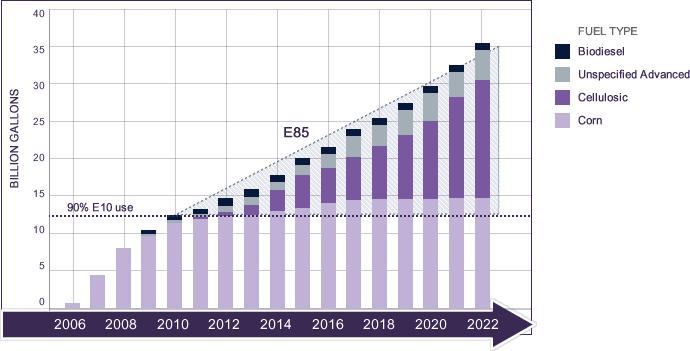-
MATERIAL ISSUES
- Materiality Analysis
-
Climate Change
- Climate Change: Related Commitments and Progress
- Greenhouse Gas Emissions Overview
- Climate Change Risks and Opportunities
- Our Strategy: Blueprint for Sustainability
- Ford's Sustainable Technologies and Alternative Fuels Plan
- Progress and Performance
- Climate Change Policy and Partnerships
- Electrification: A Closer Look
- Mobility
- Human Rights
- Vehicle Safety
- Sustaining Ford
- Perspectives on Sustainability
Toolbox
Renewable Fuel Policies
Today, more than 80 percent of global oil reserves are limited to 10 countries, while biofuels made from sugarcane can be produced in more than 100 countries. First-generation biofuels are playing an important role in building consumer awareness and spurring capital investment in infrastructure and facilities that can be used for more promising second-generation biofuels.
Policies across the globe are aimed at increasing the use and availability of biofuels. The United States adopted the Renewable Fuel Standard requiring 36 billion gallons of biofuels by 2022, including more than 20 billion gallons of low-carbon advanced biofuels. The EU Renewable Energy Directive establishes a 10 percent renewable energy target for transportation energy in 2020. And Brazil has had a very aggressive domestic ethanol program for years.
But these policies aren't enough. Providing value is critical to engage consumers and get them to use alternative energy sources. Hundreds of millions of vehicles in operation today were designed to use ethanol blends containing less than 10 percent ethanol, and our transportation energy infrastructure was set up to deliver petroleum-based fuels.
Ford is a leader in providing vehicles that can operate on biofuels. We are expanding our offerings of flexible-fuel vehicles because of the tremendous opportunities with biofuels. Ford's vision for biofuels is for them to be an alternative to gasoline rather than simply a gasoline additive – where accelerated use of renewable fuels delivers increased energy security, enhances economic development and helps to address climate change. This vision will require rapidly expanding the number of vehicles that can operate on biofuels, increasing the number of stations offering biofuels, developing the fuel distribution network to support customer choice and value, and achieving technology breakthroughs to commercialize advanced biofuels.
U.S. Renewable Fuel Standard
